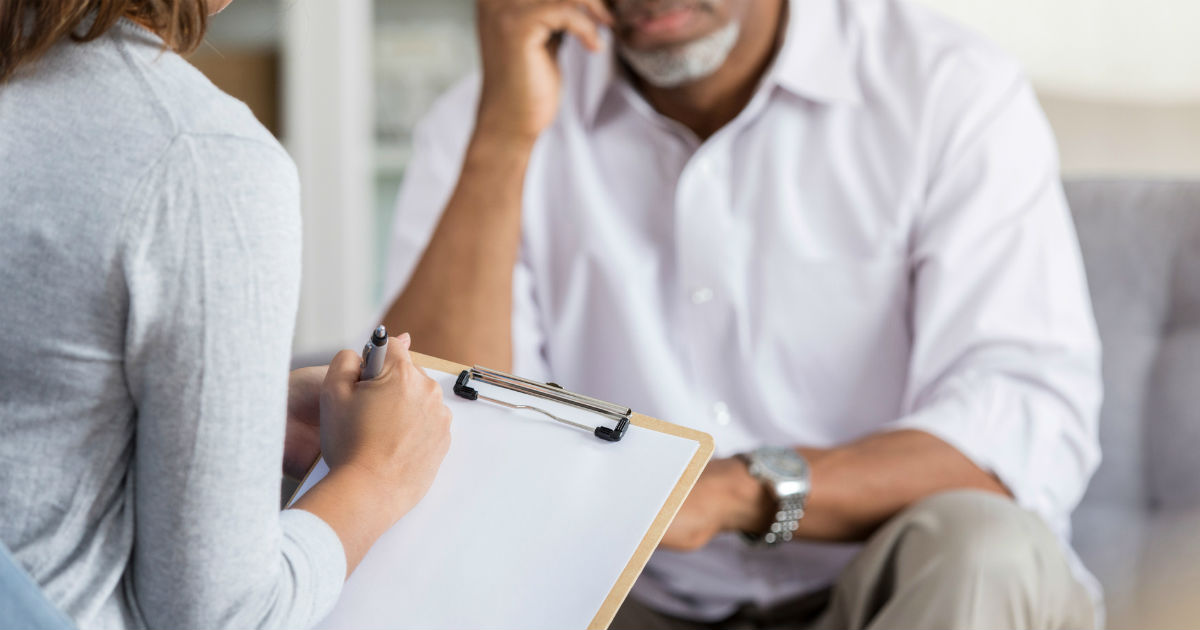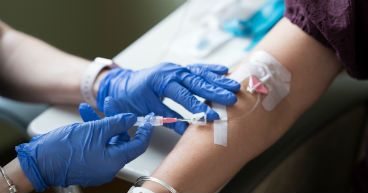
Cancer doesn’t just affect your body; it may also affect your mind. A cancer diagnosis may trigger feelings of depression and anxiety. It may change your relationships with your spouse, family and friends. And treatments, such as chemotherapy, may take a toll on your ability to concentrate.
In a recent Twitter chat, John Kenny, MD, a Psychiatrist at Cancer Treatment Centers of America® (CTCA) in Phoenix, answered your questions about the toll cancer may take on your mental health, offering ways to deal with potential changes in your psyche and your relationships.
Question: There is a stigma around openly discussing mental health. If patients are hesitant to talk to their oncologist about issues they may be having with depression and anxiety brought on by their diagnosis, how can they go about getting help?
Answer: Depression and anxiety are part of dealing with cancer for many, if not most, cancer patients. They are having the same reaction to their circumstances that many patients before them have had, and the whole treatment team is aware that this can happen. Their oncologist and treatment team want to help them through the difficulties of coping with cancer. If they ask for help, we are trained to help them.
Q: What role can online support like social media and patient communities play in mental health support?
A: Social media cuts both ways. You may find people who understand what you are going through, but you may also come across others who have no idea and are insensitive to your circumstances. Patient communities, like those found at Cancer Treatment Centers of America® (CTCA), are a great resource for support. Other patients can understand what you are going through in a way that friends and family sometimes can’t because these other patients have gone through it, too. No one solution is a good fit for everyone. Look at your options for support and figure out what works best for you.
Q: Chemo brain is real, and can be a limiting and embarrassing long-term side effect. How can patients cope with chemo brain as part of their “new normal,” especially in situations where they may not want to disclose their history with cancer?
A: Decreased concentration, difficulty finding words to express yourself, challenges with multitasking, shorter attention span—these are common side effects of chemo brain. Many patients let loved ones know what’s happening, so they understand and take simple steps, like making lists and writing things down more, to cope. It can be difficult for those who are going through cancer treatment to deal with this, but doing your best to write down reminders and lists and asking co-workers you trust to remind you of things if you forget—these strategies tend to help. Another tip: Use the reminder function on your cell phone or carry a small notebook to write things in. And very importantly, don’t beat yourself up because your concentration isn’t as good as it was. This is a side effect of medication. It’s not your fault and not something you did wrong.
Learn more about chemo brain and exercises to help.
Q: One thing patients frequently encounter is the surprising change in friendships/relationships after a diagnosis. How can patients cope with the loss or disappointment from people they relied on before cancer?
A: This is a huge deal for most patients. People you thought you were close to disappear, and people you didn’t think cared show up to help. This is part of most people’s cancer journey. Spending time with someone who is sick frightens some people. It reminds them of their own mortality and makes them feel helpless. So, they may run away because they can’t handle feeling that way. Try to understand why they behave the way they do and try to forgive them if you can. Carrying around anger toward them won’t help you. Be open to those who do show up to help, even when you didn’t expect it. For most patients, cancer changes virtually every aspect of their lives. They are not the same person after cancer. Many of their friendships have changed, and in some cases, their marriages have been impacted, and their relationships with their children have changed. This is a common part of most patients’ cancer journey. Use your support networks. Talk to those who remain in your life. Talk to a therapist or a cancer support group. Other people are going through this, too.
Q: Patients go to their oncologist for care, but where can caregivers go to meet their cancer-related needs, like caregiver burnout, mental health struggles, psychosocial support and career and peer support?
A: I think that varies, as different people have different resources. Some may have a close friend group that supports them. Others may join a family member support group, see a therapist regularly or get support through their church. Only you can figure out what the right fit for you is, and there is no one way to go about it. The important take-home message is that you need support. Caring for someone with cancer doesn’t just impact those who are sick. It impacts everyone around them as well. You can’t care for someone else if you are burned out. Caring for yourself is essential to caring for others.
Q: Patients and their partners can both feel the strain and stress of cancer. What can couples do during and after treatment to help their relationship stay the course amid the storm of cancer?
A: Communication is the most important piece in seeing that your relationship survives cancer. Being able to talk about what you’re going through, and how it’s impacting you both, is essential. Couples who shut down and don’t talk about their fear, frustration, guilt, anger, sadness, grief don’t do well. These are normal emotions that most people experience at one time or another in dealing with cancer. Some couples’ relationships don’t survive the illness because one or both shut down or run away. If you were having trouble in your relationship before cancer, those issues often get magnified under the stress of the illness. It takes real effort on both people’s parts to preserve the relationship.
If you feel the relationship is falling apart for any reason, get into couples counseling. Getting a neutral outsider to look at the situation with you often helps people figure out how to fix it. We all have times in life where we lose perspective, and serious illness can definitely be one of those times.
Q: What advice or resources would you offer parents to help them help their children navigate the changes that cancer brings for their family?
A: How you handle cancer with your children depends on their age. Explaining what is happening to them in an age-appropriate way, at a level they can understand, is very important. Kids have amazing emotional radar. They can sense when things aren’t right in the family. When you are sick, both you and everyone around you will behave differently. You can’t hide this from kids. You want to be as open as they can grasp and model appropriate emotions for them. It’s normal to be sad, angry, anxious, frightened. You want to normalize their emotions and give them room to express them. Some kids will be able to say how they feel. Others will act it out with peers or teachers or within the family. Some young children will regress and behave as if they are younger than they are. Teens may turn sadness into anger and get angry at everyone and everything. Every kid is different. If you feel they are not handling the situation well or are reacting in a self-destructive manner, get them help. Therapy with a neutral adult can make a big difference.
Learn more about how to talk to your kids about cancer.
Q: Cancer can force a patient and caregiver to scale back or suspend their career. This can leave gaps in resumes, create concern about job security and add to their financial burden. What advice and help can patients and caregivers get if they are concerned about work?
A: This is a huge deal for many patients. Cancer can lead people to stop working and may lead to financial ruin. There is no one answer, but depending on family, patients may face a number of challenges, from applying for disability to changing careers or simply starting over once their cancer treatment is complete. Our identity and sense of self-worth are often tied up in our work. Having to bring that to an abrupt halt can wreak havoc on our moods. We may grapple with who we are now that these changes have happened. Having to fill empty days that were previously filled with work can be difficult and depressing. Feeling socially isolated by not seeing everyone at work anymore is hard. Centering your life around chemotherapy treatments and doctors’ appointments takes its toll. Cancer upends your whole life. Ask for help, whether in the form of family support, legal assistance, social work help in knowing what benefits you are eligible for, or the wisdom provided by other cancer patients who have already been through what you are going through. Cancer often means giving up some of our independence, both financial and otherwise, be it temporarily or permanently. Those who do best often focus on what they can control and let go of what they can’t.


